最后一场灾难 One Final Plague
News
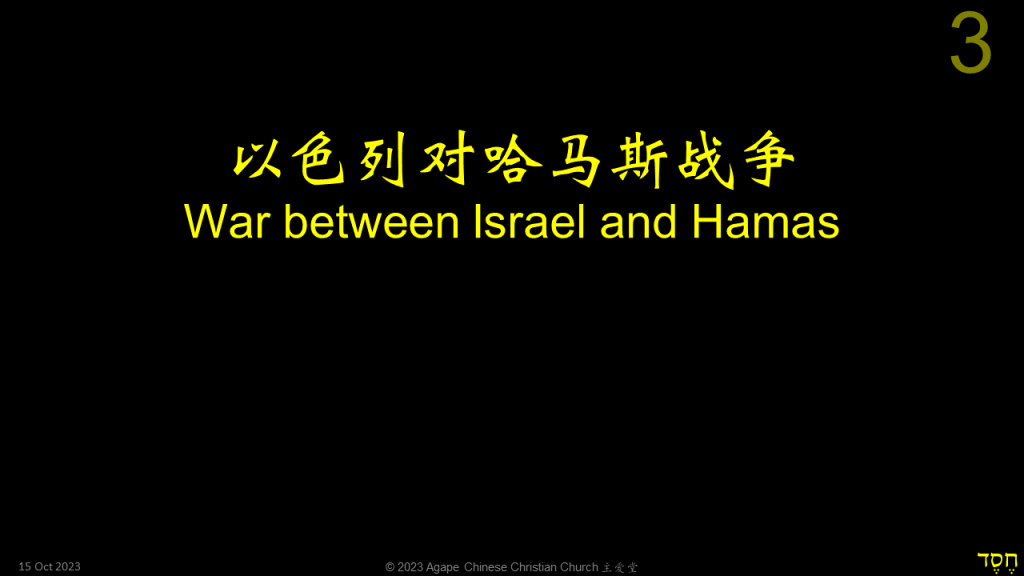
哈马斯 Hā mǎ sī
哈马斯 Hā mǎ sī
Hamas.
From Wikipedia:
Hamas is an acronym of the Arabic phrase حركة المقاومة الإسلامية or Ḥarakah al-Muqāwamah al-ʾIslāmiyyah, meaning “Islamic Resistance Movement”. This acronym, HMS, was later glossed in the Hamas Covenant by the Arabic word ḥamās (حماس) which itself means “zeal”, “strength”, or “bravery”. In Hebrew, there is a similar-sounding word, ḥāmās (חמס) connoting “violence”, a phonetic resemblance that possibly helped further Israeli negative perceptions of the movement.
Some people take Hamas to mean “violence,” but I think that’s incorrect. This is mixing a word from another language (Hebrew) with Arabic, based simply on their similar sounds.
恐怖组织 Kǒngbù zǔzhī
恐怖组织 Kǒngbù zǔzhī
Terrorist organisation. I take Hamas to be a 恐怖组织.
Review
Meaning of “harden his heart”
See Obsidian note here.

We need to review the meaning of “hard heart” as used in the Bible.
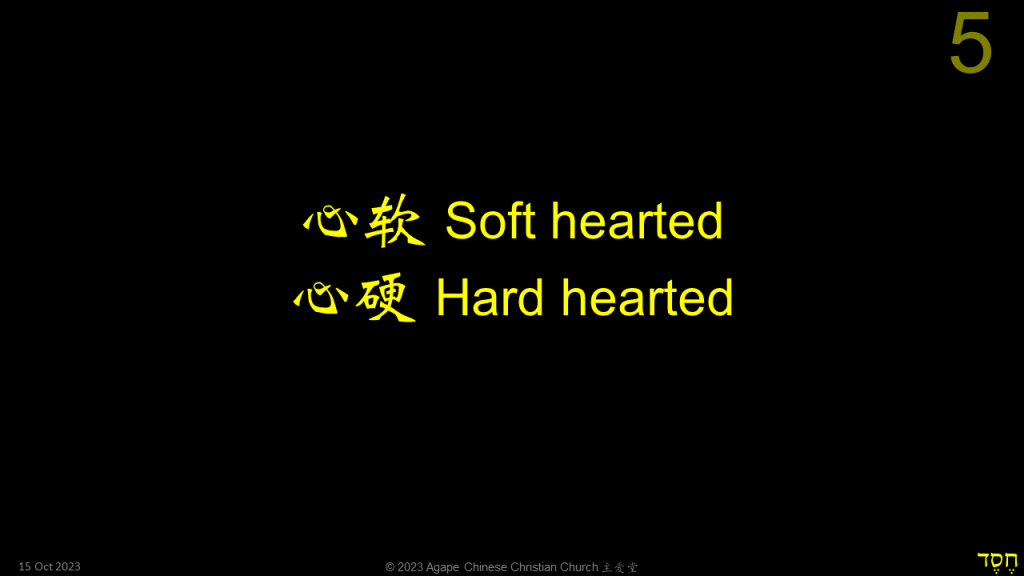
When we say someone is “soft hearted” or “hard hearted,” what characteristics are we talking about?

These are what we normally think of when we say someone is hard hearted.

But this is not what the Bible means. The word that English Bibles translate as “hard” hearted has a very different meaning in Hebrew.
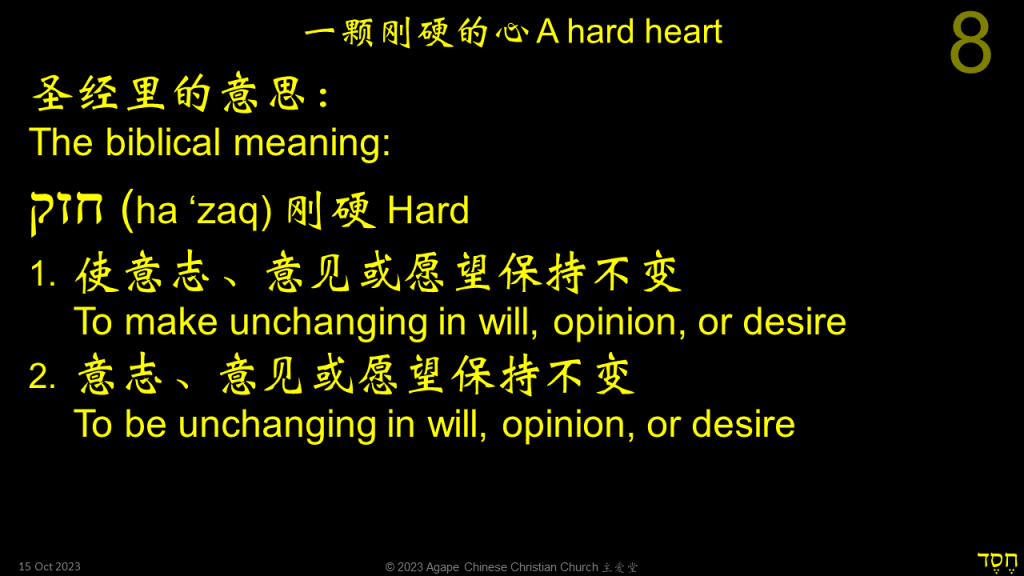
These are the meanings of the Hebrew word חזק (ha ‘zaq) when its translated into “hard” hearted in English or 刚硬 in the CUV. Note that these don’t have anything to do with someone’s compassion or emotions.

Two example verses from meaning #1: To make unchanging in will, opinion, or desire.
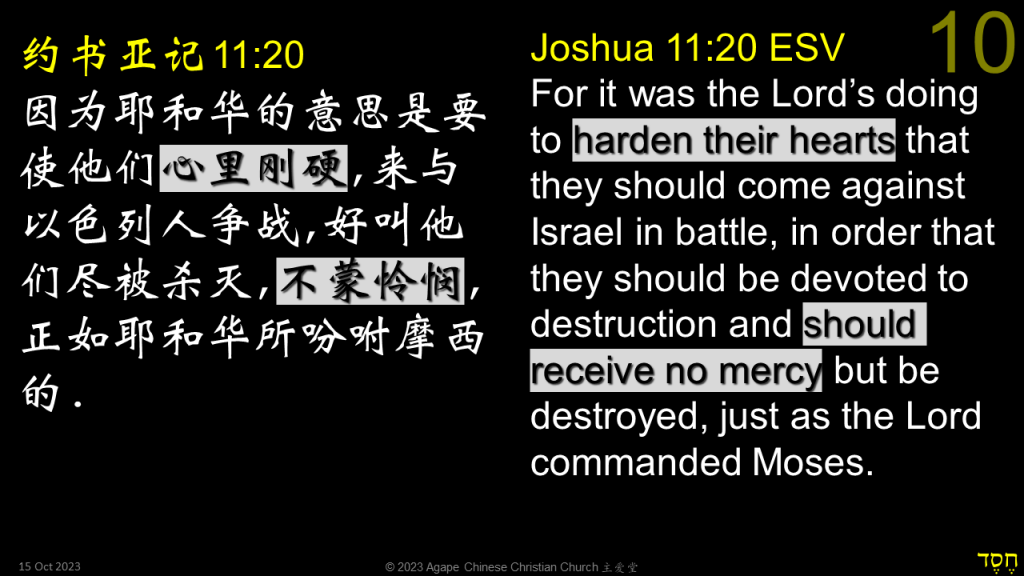
Their hearts are hard (unchanging), and thus they won’t receive God’s compassion or mercy. Note that the hardness of their hearts has nothing to do with mercy. In fact, they’re not receiving mercy because their heart is hard.
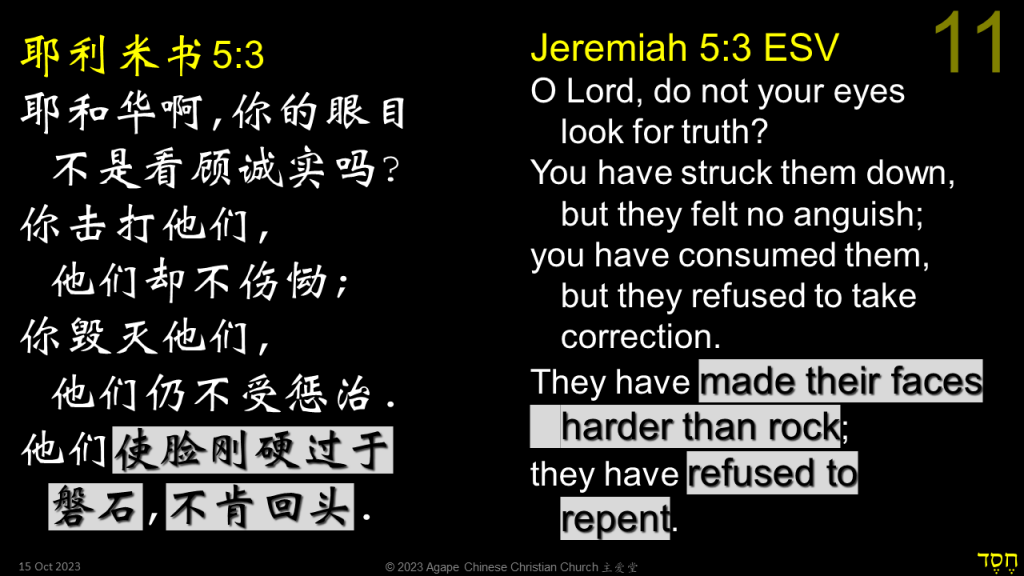
This passage is even more clear: they refused to to repent (refused to change their minds).
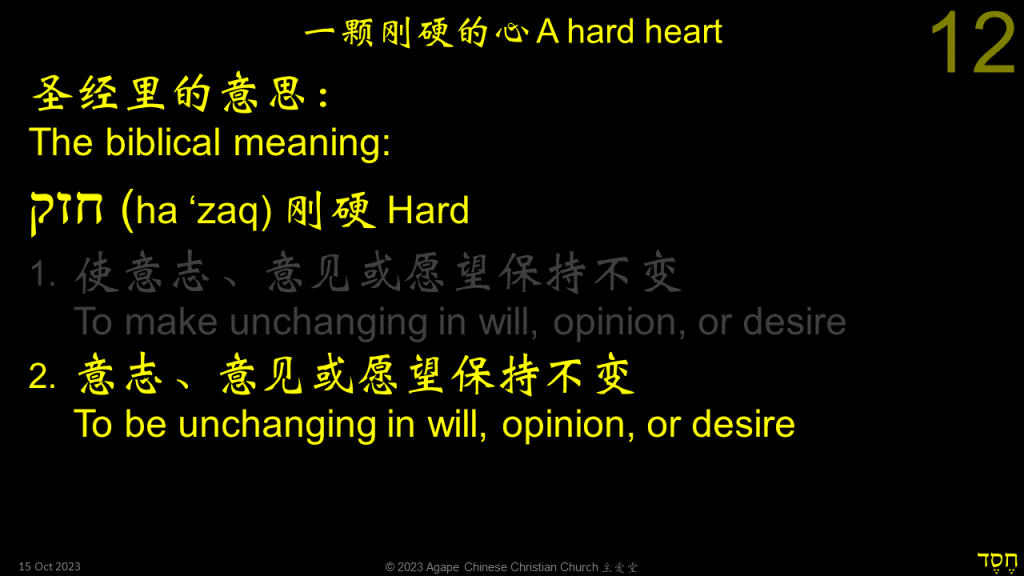
Two examples from the 2nd meaning: to be unchanging in will, opinion, or desire.
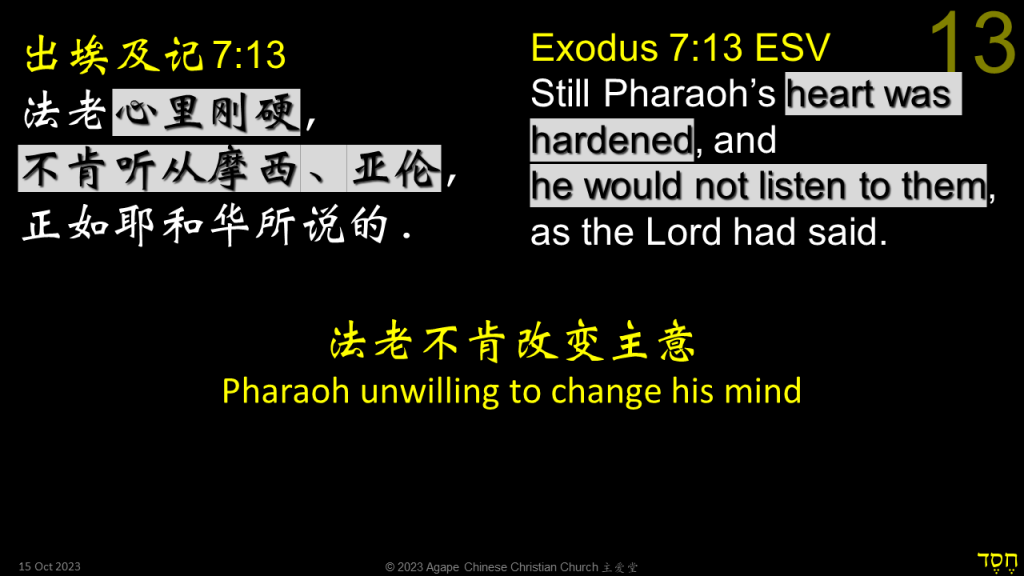
Pharaoh’s heart was hardened (whether by himself or by God), and he won’t listen to them. I.e., he won’t change his mind.

Same here. Pharaoh won’t change his mind.

强迫 Qiǎngpò
强迫 Qiǎngpò
To force.
In the Bible, to be hard hearted means you’re stubborn, obstinate, refusing to change your mind. This is what Pharaoh was like. His heart was set to be against God, which is how all of us are at first. However, we have changed our minds (repented) and turned towards God. God kept trying to get Pharaoh to change his mind (plague after plague, each more devastating that the previous), but Pharaoh was so obstinate that he refused to change. Finally, by about the 6th plague, God more or less said, “If you still refuse to change, so be it! I’ll make you even more obstinate!”
Note that we can’t say God forced Pharaoh to refuse to listen and that God is unfair in punishing him. In fact, God kept trying to make him change. It’s Pharaoh who won’t change, and after a while, God just let him be (hardened Pharaoh’s heart, i.e., let Pharaoh keep his own way).
Review of final slide from last sermon (231001)

威胁 Wēixié
威胁 Wēixié
Threat, to threaten.
Today’s passage continues from last time, right after Pharaoh said “Next time you see my face, you’ll die.” (see Exo 10:28–29) So today’s passage continues with Moses responding to Pharaoh.
This means there shouldn’t be a chapter division at the end of Exo 10:29.
Hook
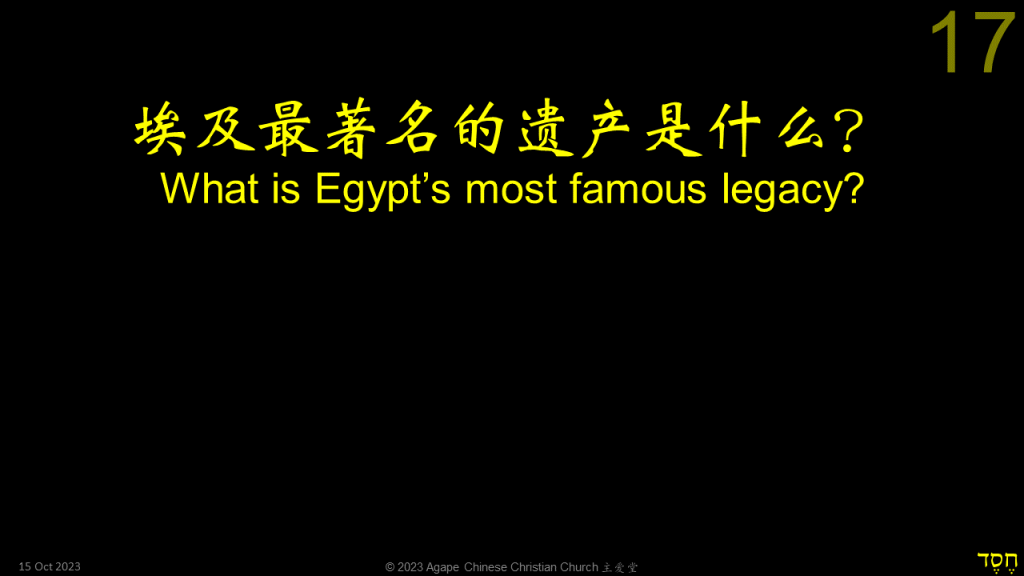


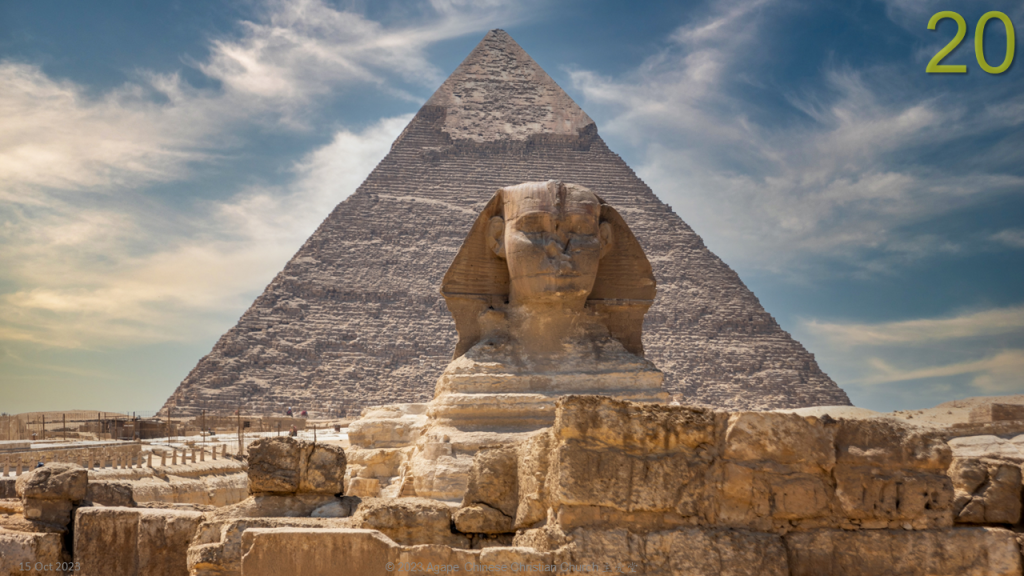
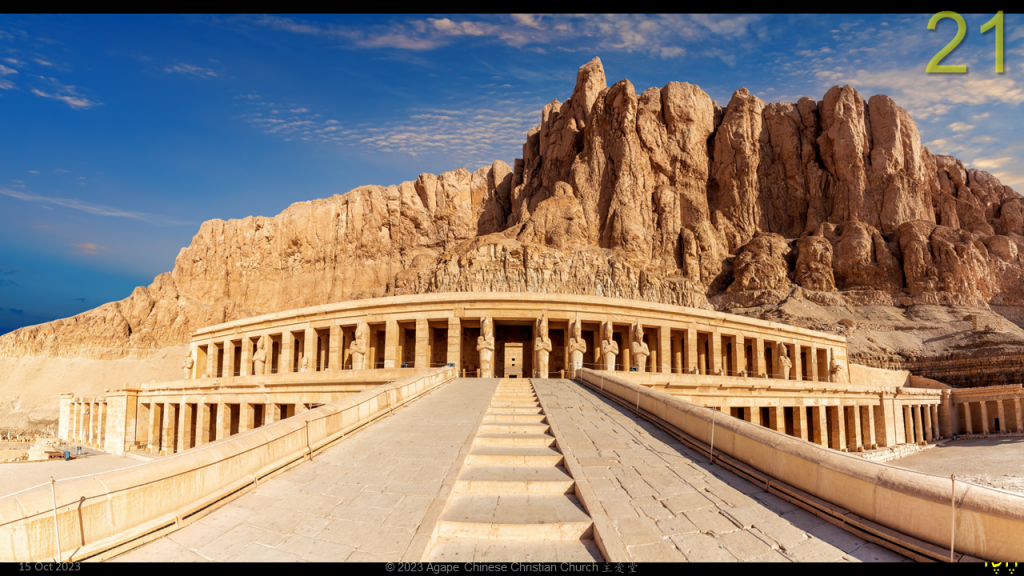
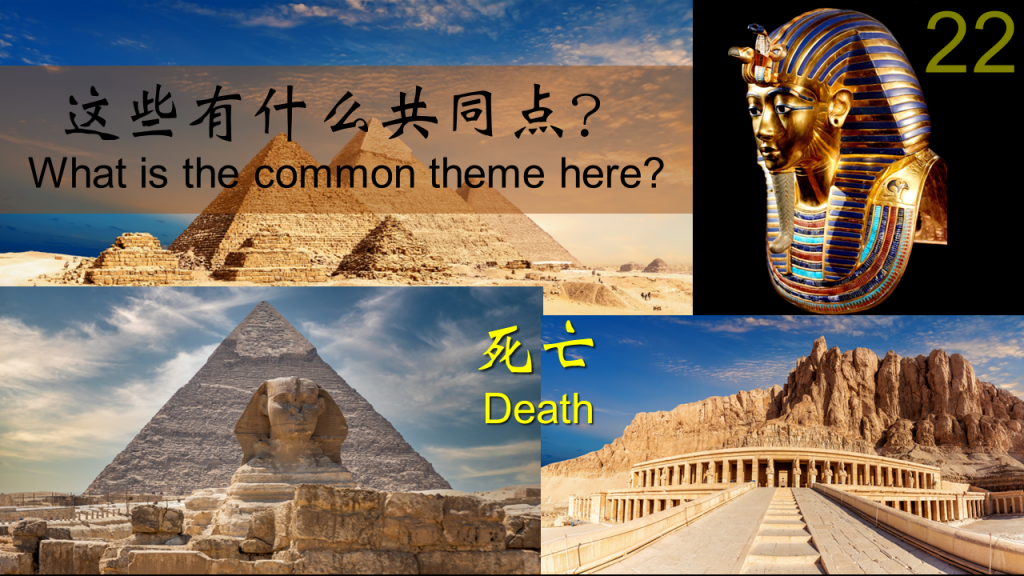
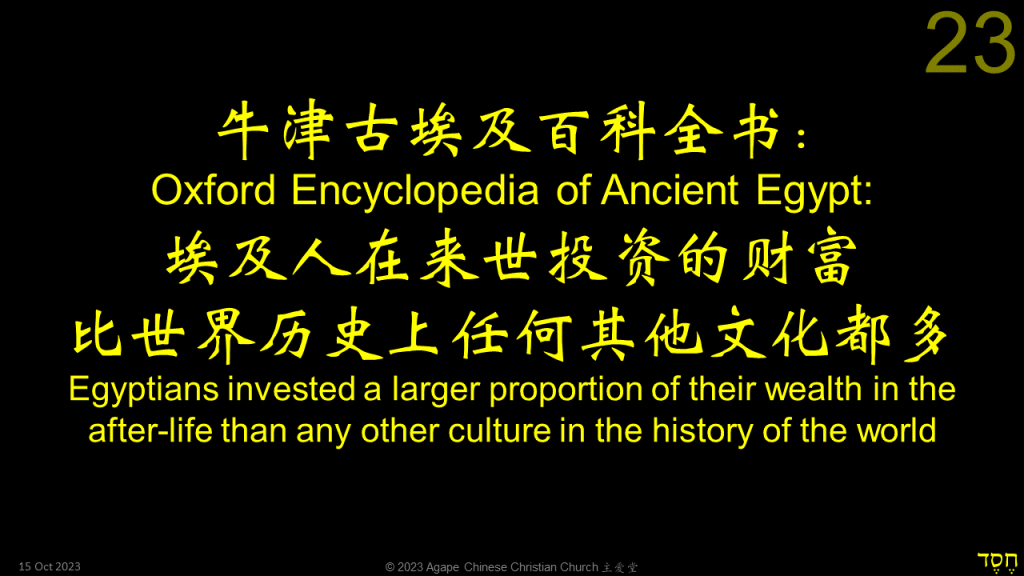
Egypt’s most enduring legacy to the world are graves (pyramids). Their mummies are on display in museums all over the world. I think there’s at least one that used to be on display in the Redpath Museum of McGill University.
Ancient Egyptian culture is almost like a culture of death. Their entire life is focused on what happens after they die.
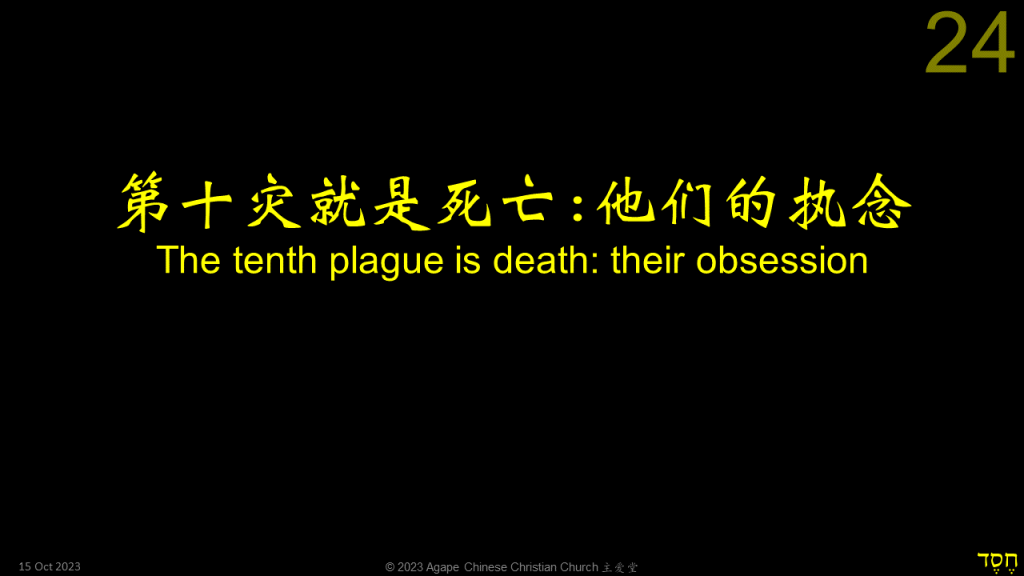
遗产 yíchǎn
遗产 yíchǎn
Legacy, heritage.
共同点 gòngtóng diǎn
共同点 gòngtóng diǎn
Points in common. E.g., 他们有什么共同点?What do they have in common?
牛津 Niújīn
牛津 Niújīn
Oxford (as in Oxford University).
投资 Tóuzī
投资 Tóuzī
Investment, to invest.
执念 zhí niàn
执念 zhí niàn
Obsession.
Passage

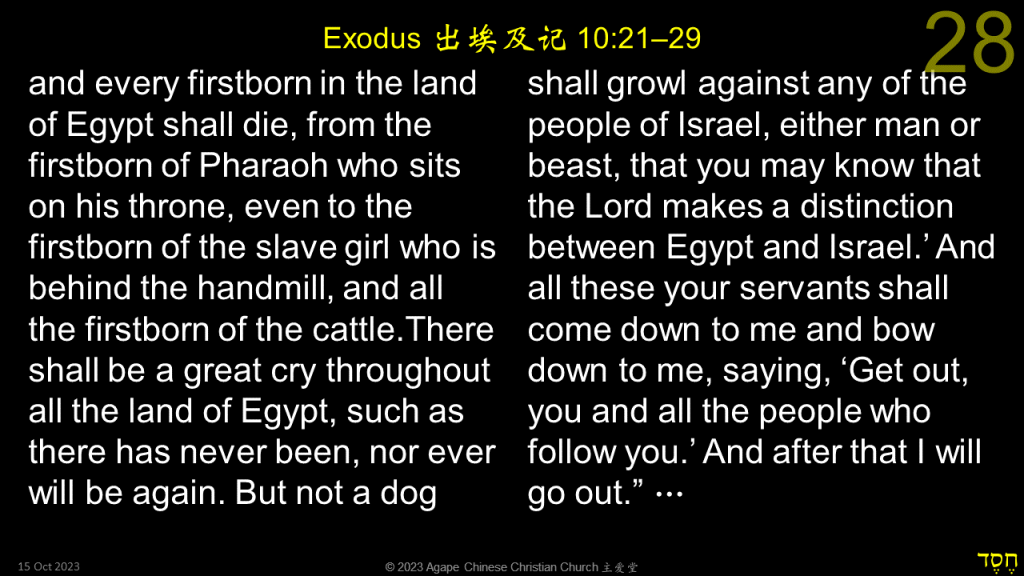
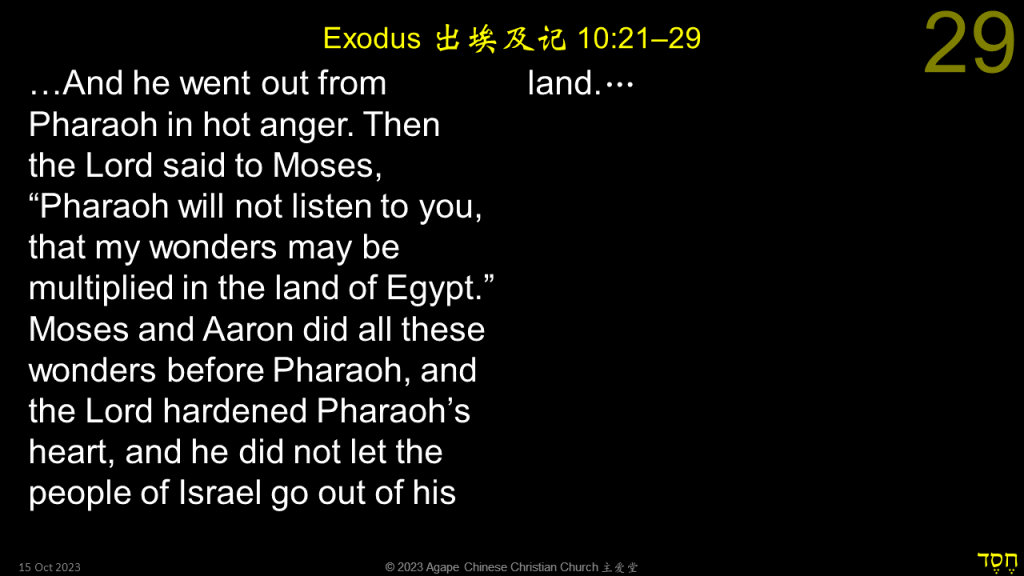
Section 1 再一场灾难 One More Plague
Passage

Exodus 11:1 ESV
The Lord said to Moses, “Yet one plague more I will bring upon Pharaoh and upon Egypt. Afterward he will let you go from here. When he lets you go, he will drive you away completely.
灾殃 Zāiyāng
灾殃 Zāiyāng
Disaster, plague. First time the word נֶ֫גַע (plague in Hebrew) is used in the book of Exodus. In all previous places where English and CUV use plague, the Hebrew is actually “sign” or “miracle.” (神迹 Shén jī)
催逼 cuībī
催逼 cuībī
To urge, to drive out.
First time the word נֶ֫גַע (plague) is used in Exodus. In all previous places where English and CUV uses plague, the Hebrew is actually “sign” (神迹 Shén jī).
Pharaoh will not willingly let them go, but in the end, he’ll actually urge them to go, driving them out of Egypt.
It’s futile to resist God. Sooner or later, he wins.
Lessons
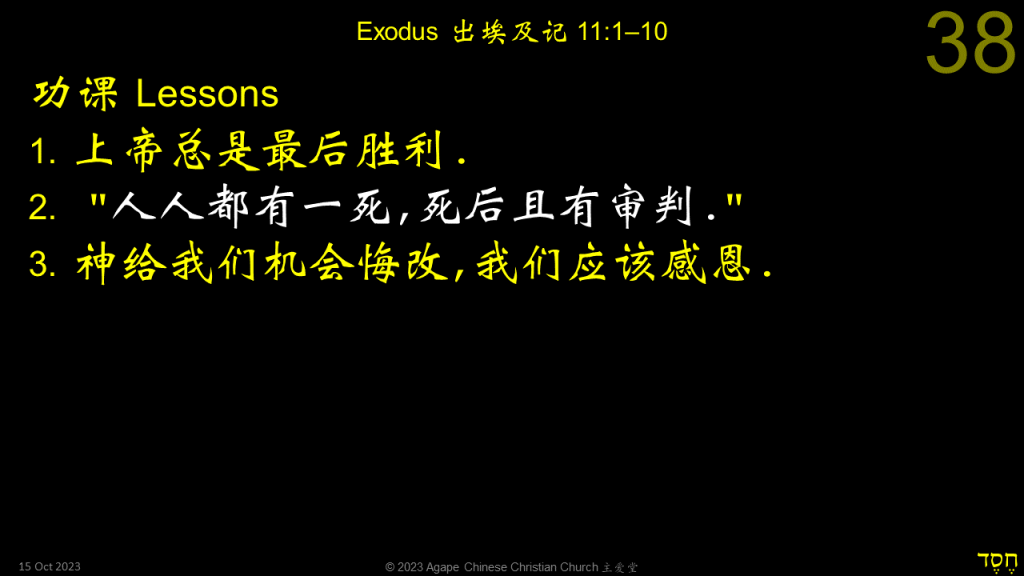
- God always wins at the end.
People often think that they’ve gotten the better of God. They might spend their entire life opposing God, thinking that God can’t do anything (or that there is no God). - But in the end, everyone will be judged. As in Heb 9:27–28:
Hebrews 9:27 ESV
And just as it is appointed for man to die once, and after that comes judgment,
3. People should be thankful that God might bring them trouble or disaster in this life as a reminder for them to repent. At least this way, they’ll have a chance to repent. Once you’re dead, that’s it.
Section 2 战利品 Spoils of War
Passage
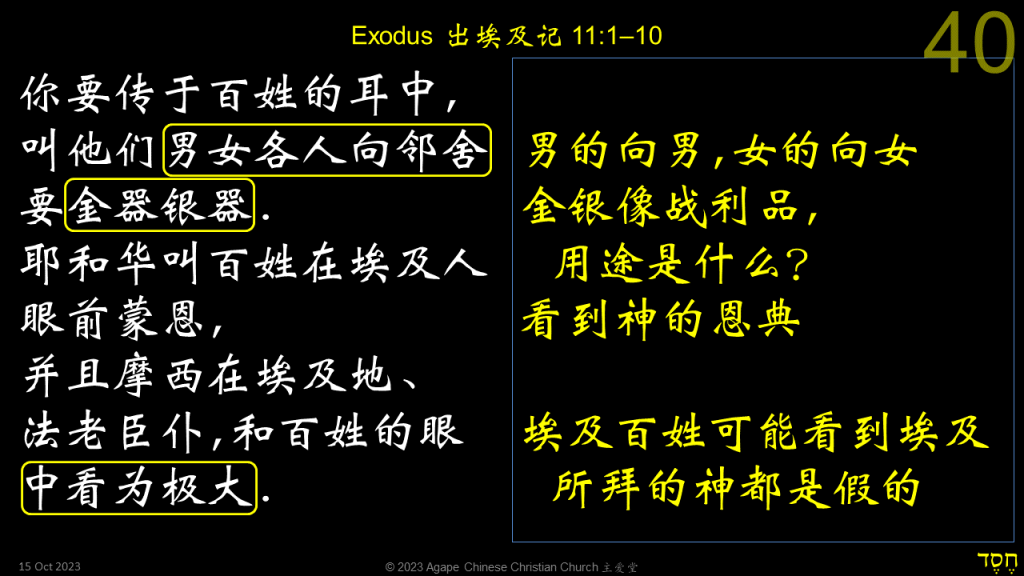
战利品 Zhànlìpǐn
战利品 Zhànlìpǐn
Spoils of war.
Exodus 11:2–3 ESV
Speak now in the hearing of the people, that they ask, every man of his neighbor and every woman of her neighbor, for silver and gold jewelry.” And the Lord gave the people favor in the sight of the Egyptians. Moreover, the man Moses was very great in the land of Egypt, in the sight of Pharaoh’s servants and in the sight of the people.
The original Hebrew separates the men and women into 2 separate phrases: each man is to request from his neighbour (male) and each woman from her neighbour (female).
These look like the spoils of war (战利品 Zhànlìpǐ). These gold and silver will appear again later: the golden calf incident, and the building of the tabernacle.
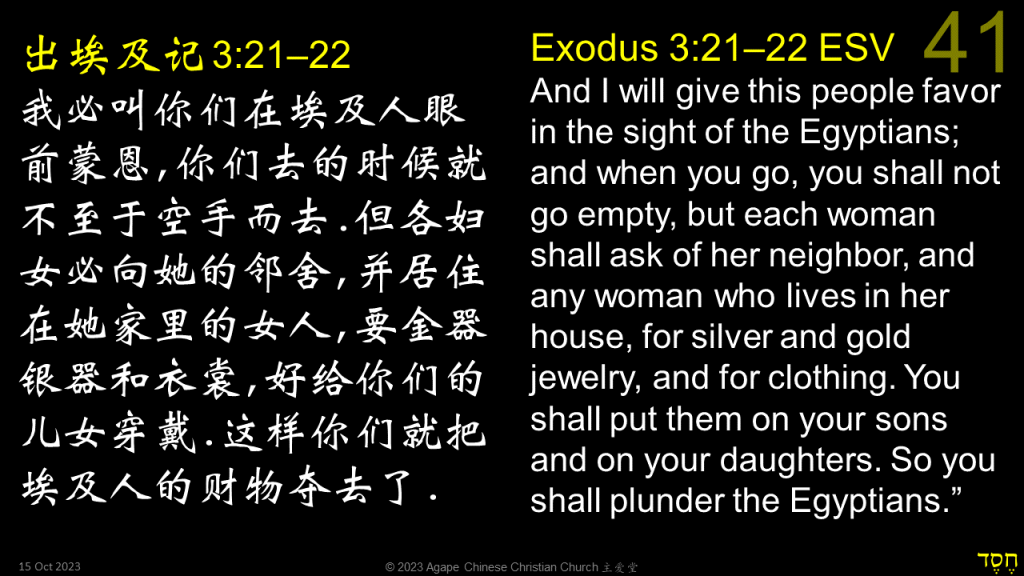
The Egyptians are beginning to realise that the gods they revere and worship are not very useful, certainly nowhere near as powerful as YHWH whom Moses serves.
Lesson here: What is our testimony to the people around us? Will we make people want to know more about the Lord that we believe in? Will our lives show a very attractive alternative to the secular world?
Lessons
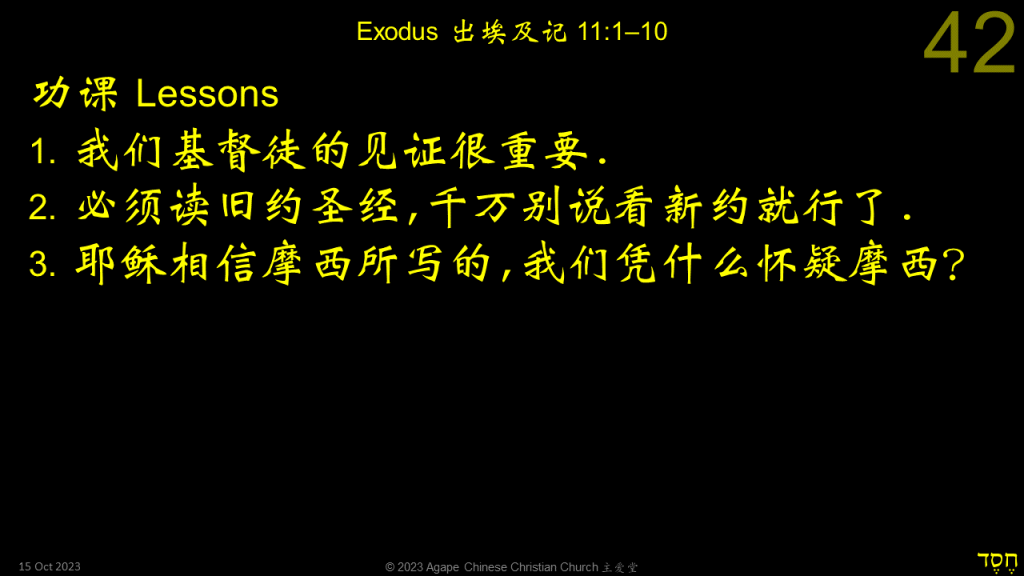
- Our testimony for God is very important.
Moses and Aaron testified for God in front of Pharaoh and the Egyptian people. - We must read the OT. Please don’t say Christians need only read the NT. Most of the NT would make no sense if we don’t know the OT background. Those who think they don’t need to know the OT are just putting their own understanding and interpretation into the NT, and quite often these understandings are wrong.
- Jesus testified about Moses when he taught his disciples (e.g., John 5:46–47).
Who are we to doubt what Moses wrote?
This includes saying things like “The Ten Commandments don’t apply to us, because we’re not Jews!”
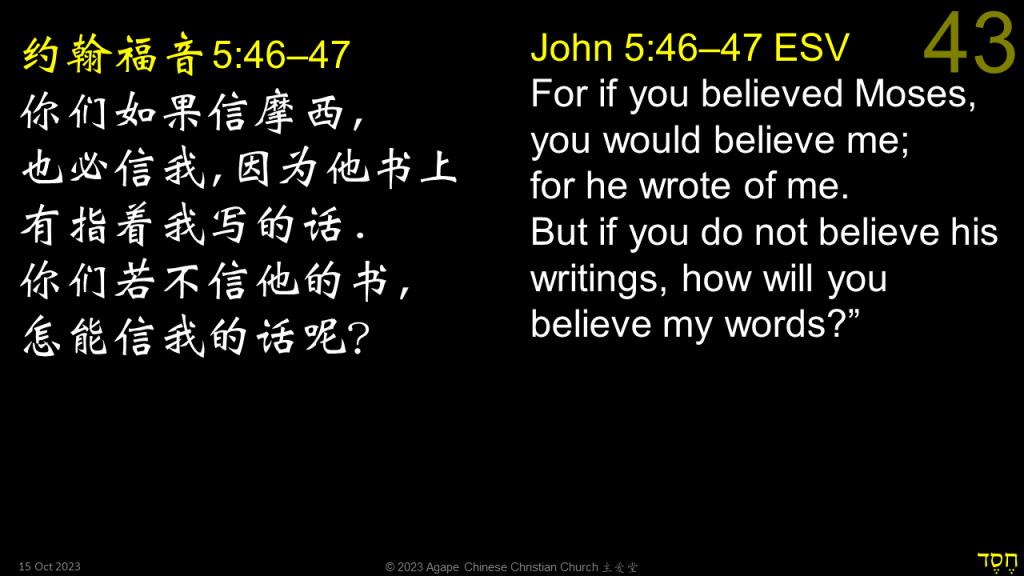
Section 3 灭长子 Death of Firstborn
Passage

Exodus 11:4–6 ESV
So Moses said, “Thus says the Lord: ‘About midnight I will go out in the midst of Egypt, and every firstborn in the land of Egypt shall die, from the firstborn of Pharaoh who sits on his throne, even to the firstborn of the slave girl who is behind the handmill, and all the firstborn of the cattle. There shall be a great cry throughout all the land of Egypt, such as there has never been, nor ever will be again.
书挡 Shū dǎng
书挡 Shū dǎng
Bookend. In Hebrew prose, we often see identical expressions at the beginning and end of some passage. These are like bookends, marking the passage as one whole unit (they don’t really have quotation marks or paragraphs like in English or French).
巡行 xúnxíng
巡行 xúnxíng
To patrol, walking around inspecting.
牲畜 shēngchù
牲畜 shēngchù
Livestock.
磨子 mó zi
磨子 mó zi
Milling stone (the big heavy stone they use to crush the grain to make flour).
婢女 bìnǚ
婢女 bìnǚ
Maidservant, servant girl.
哀号 āiháo
哀号 āiháo
Wailing, sound of despair.
This 我必出去 will be repeated at the end of v. 8b 然后我要出去. This bookend is one of the reasons for putting the closing quotation mark at the end of v. 8b, instead of v. 7 (NET or CUV, and pretty much all other translations, English or Chinese).
YHWH will go throughout the land of Egypt, killing the firstborn.
From the highest person in Egypt (he’s considered as a god), while the slave girl behind the milling stone is one of the lowest in position in Egypt. All will be affected by the plague, regardless of social status.
No one is spared, even the livestock (whatever’s left after the hail of plague #5 and disease of #7).
Why kill the firstborn? Some see this as retribution for Pharaoh killing the firstborn of Israel in Exo 1. But maybe it’s more than that. The Israelites will not be automatically protected from death. They must follow God’s recipe of the Passover lamb. Similary, the Egyptians can also be saved if they also use the blood of the Passover lamb. This might be more a theological lesson: salvation is the work of God, we are saved only by his method. In OT days, it was the Passover lamb and sacrifices, after Jesus, it is now faith in Christ Jesus.

YHWH already mentioned this final plague back in Exo 4:21–23:
“Let my son go that he may serve me.” If you refuse to let him go, behold, I will kill your firstborn son.’ ”
Lessons
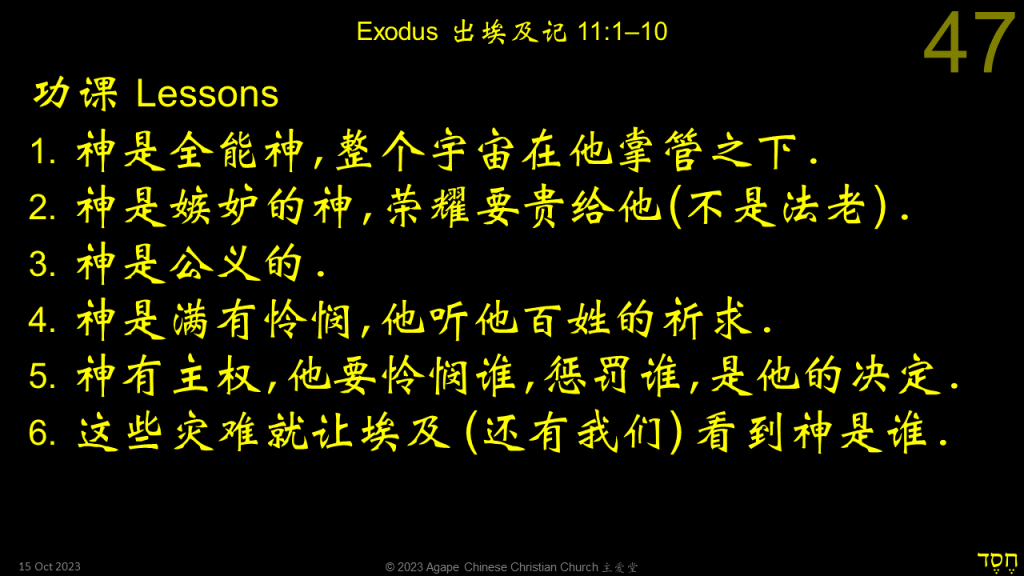
- God is God Almighty. The entire universe is under his control.
- God is a jealous God. We must give him glory; he will not share share his glory with anyone else.
- God is just.
- God is merciful, he listens to his people’s prayers.
- God is sovereign. He will have mercy on whom he wishes, and punish whom he wants to punish. The decisions are his.
- These plagues showed Egypt (and us) who YHWH is.
Section 4 神要分别 God makes a distinction
Passage

Exodus 11:7–8a ESV
But not a dog shall growl against any of the people of Israel, either man or beast, that you may know that the Lord makes a distinction between Egypt and Israel.’ And all these your servants shall come down to me and bow down to me, saying, ‘Get out, you and all the people who follow you.’ And after that I will go out.”
摇舌 yáo shé
摇舌 yáo shé
To wag its tongue, to growl or bark.
俯伏 fǔfú
俯伏 fǔfú
To prostrate oneself, to bow down on the ground as before a king or God.
引号 yǐnhào
引号 yǐnhào
Quotation marks.
Why mention dogs? Why mention dogs? It’s possible this is a jab at Anubis, the Egyptian god of the underworld (and also Osiris, god of the dead and afterlife). Anubis guides the dead as they journey through the underworld. So here Moses is saying that Anubis will have no control over the dead. Even in death (i.e., after leaving this world), the gods of Egypt are useless.
CUV and most English translations end God’s speech here (end of v. 7) with the closing quotation mark. Thus the following sentence would then be Moses talking, not God. It’s best to end the quote at v. 8b instead. See below for more details.
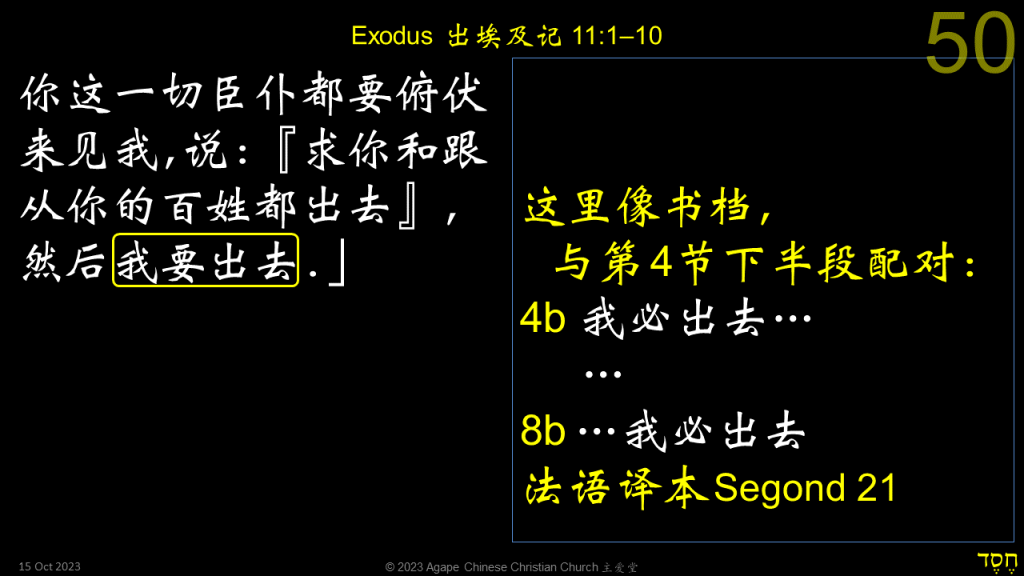
This is a continuation of Moses quoting what God told him to say to Pharaoh. Most translations, including CUV, NET, ESV all end God’s speech at the end of v.7. NIV ends it at v. 7a (so “then you will know that the LORD makes a distinction…” is Moses talking, not God). But it’s better to put the closing quote at the end of v. 8b, so ending with “After that I will leave.”
The French translation “Segond 21” is one translation that ends the quote at end of 8b. Following from [biblegateway](Segond 21 (SG21) – Version Information – BibleGateway.com):
La Segond 21 est une traduction de la Bible éditée pour la première fois en 2007, fruit de 12 ans de travail sur les textes hébreu, araméen et grec. Son objectif? Proposer une formulation française fidèle à l’original, dans le langage actuel, d’où la formule «L’original, avec les mots d’aujourd’hui».
I actually saw the Segond 21 translation in Sophia’s new home in Oshawa (奥沙瓦 Ào shā wǎ)! Her mom invited us to drop by on our way to Toronto, so we visited them Last Wednesday.
Original Hebrew has no quotation marks. Most of the time, it’s easy to tell when a speech starts and ends. But once in a while, there are ambiguities.

Why take God’s speech to end at 8b? Here are the 2 main reasons:
- The end of 8b has an inclusio (like a bookend, the start and end of a passage having the same words), “I will go 我必出去” at the beginning (v. 4b) of the speech, and “After that I will go 然后我要出去” at the end of 8b.
- Throughout the OT, we’ve never seen any Egyptian prostrating themselves before Moses, so this doesn’t seem to match what we know of Moses. It would make more sense if the Egyptians prostrated themselves before YHWH.
Lessons
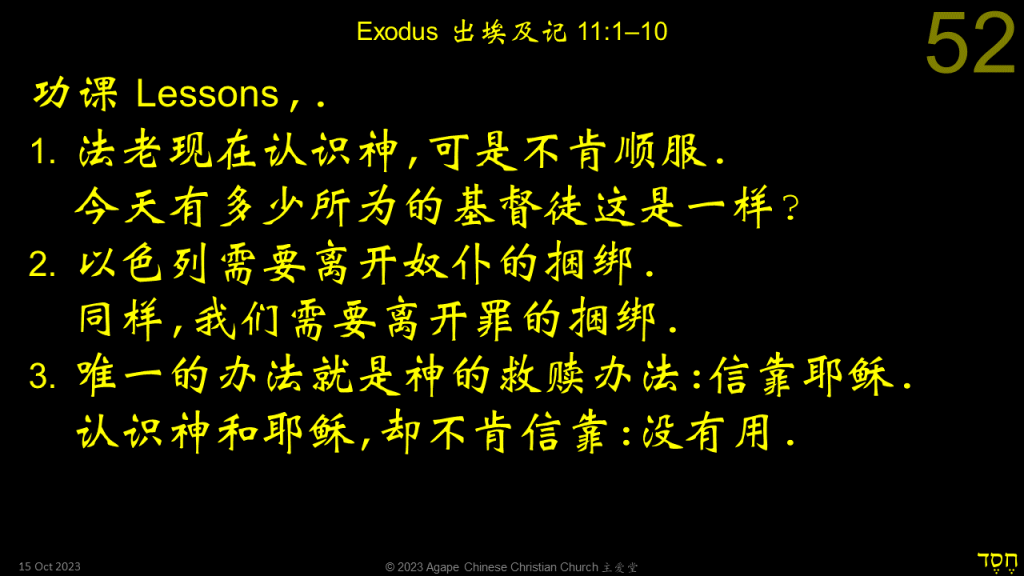
- Pharaoh now knows who YHWH is, but he still won’t submit to God.
Today, how many so called Christians are exactly like this? They know about the Bible, they know about God, but they won’t give their heart to Jesus. - Israel needs to leave the bondage of slavery in Egypt.
In the same way, we need to leave the bondage of sin. - The only way out is God’s way of salvation: through faith in Jesus.
Knowledge of God or the Bible won’t save you.
Section 5 法老心刚硬 Pharaoh Hardens His Heart
Passage
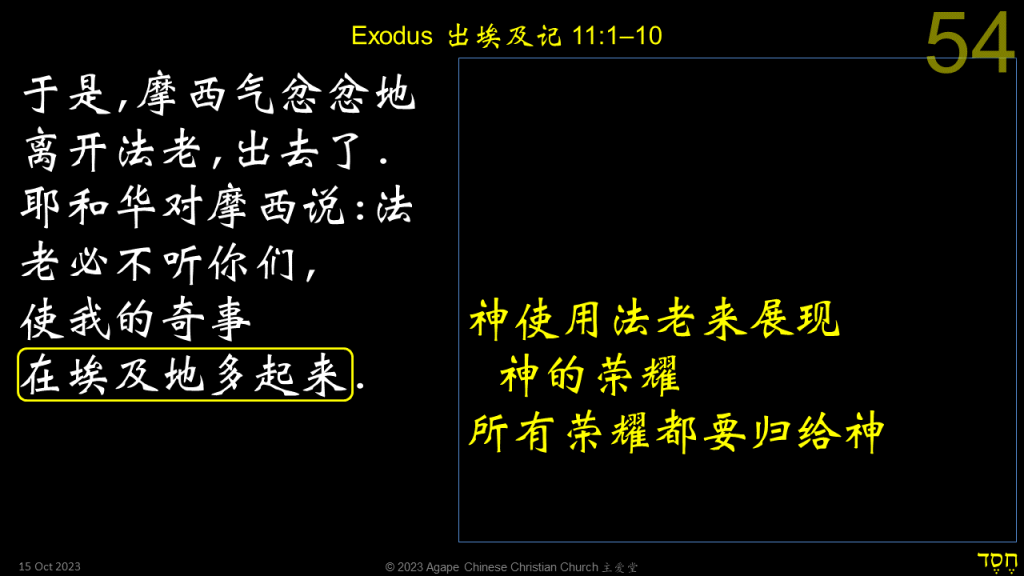
Exodus 11:8b–10 ESV
And he went out from Pharaoh in hot anger. Then the Lord said to Moses, “Pharaoh will not listen to you, that my wonders may be multiplied in the land of Egypt.” Moses and Aaron did all these wonders before Pharaoh, and the Lord hardened Pharaoh’s heart, and he did not let the people of Israel go out of his land.
气忿忿 qì fènfèn
气忿忿 qì fènfèn
Great anger, hot anger (hot anger are exactly the words in Hebrew).
顽固 Wángù
顽固 Wángù
Obstinate, stubborn.
Once more, God hardens Pharaoh’s heart. Note again that God didn’t force Pharaoh to disobey him. In fact, God tried time and time again to make Pharaoh change his mind, but to no avail. So if Pharaoh wants to be obstinate, God just lets him.
The same lesson applies to us. God will give us chance after chance, through many different methods, to change our minds to follow him. But if we continue to be stubborn, there comes a point when when God will say, “That’s it!”
Final Lessons

- Pharaoh is being used by God. His actions has been scripted so that God can execute his plan.
- In the face of death, and in view of God’s mercy, the only satisfying way to live is for the glory of God.
